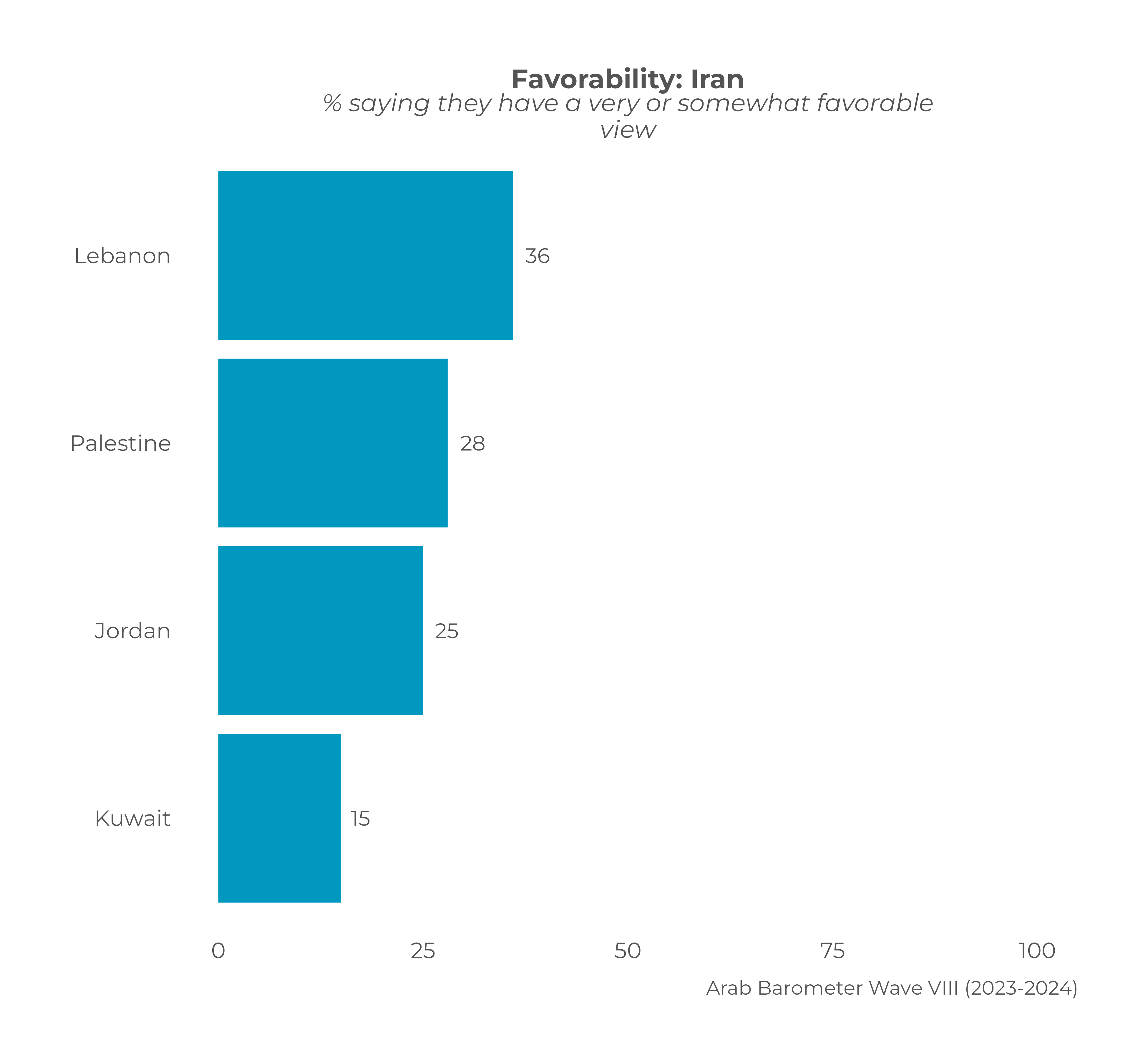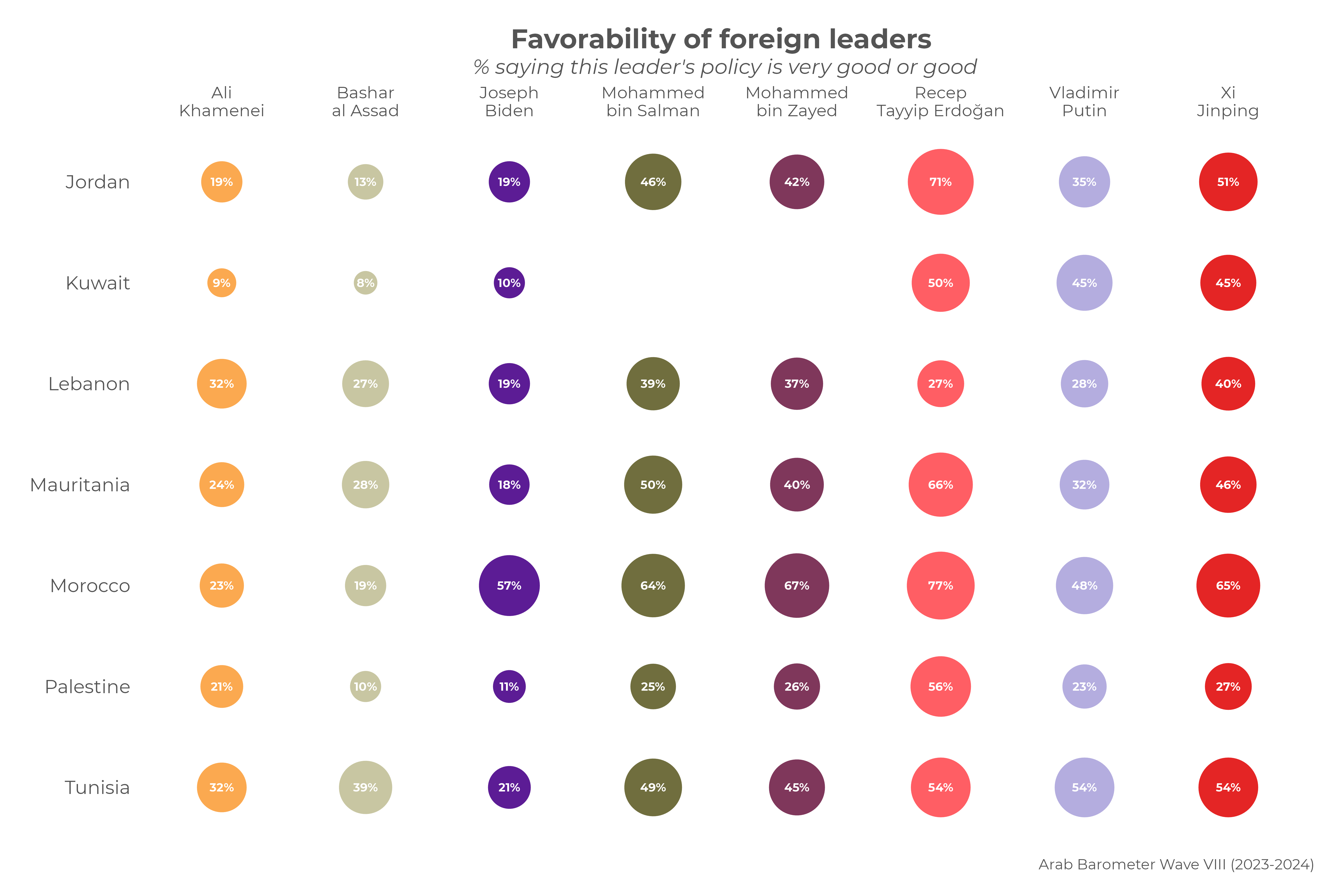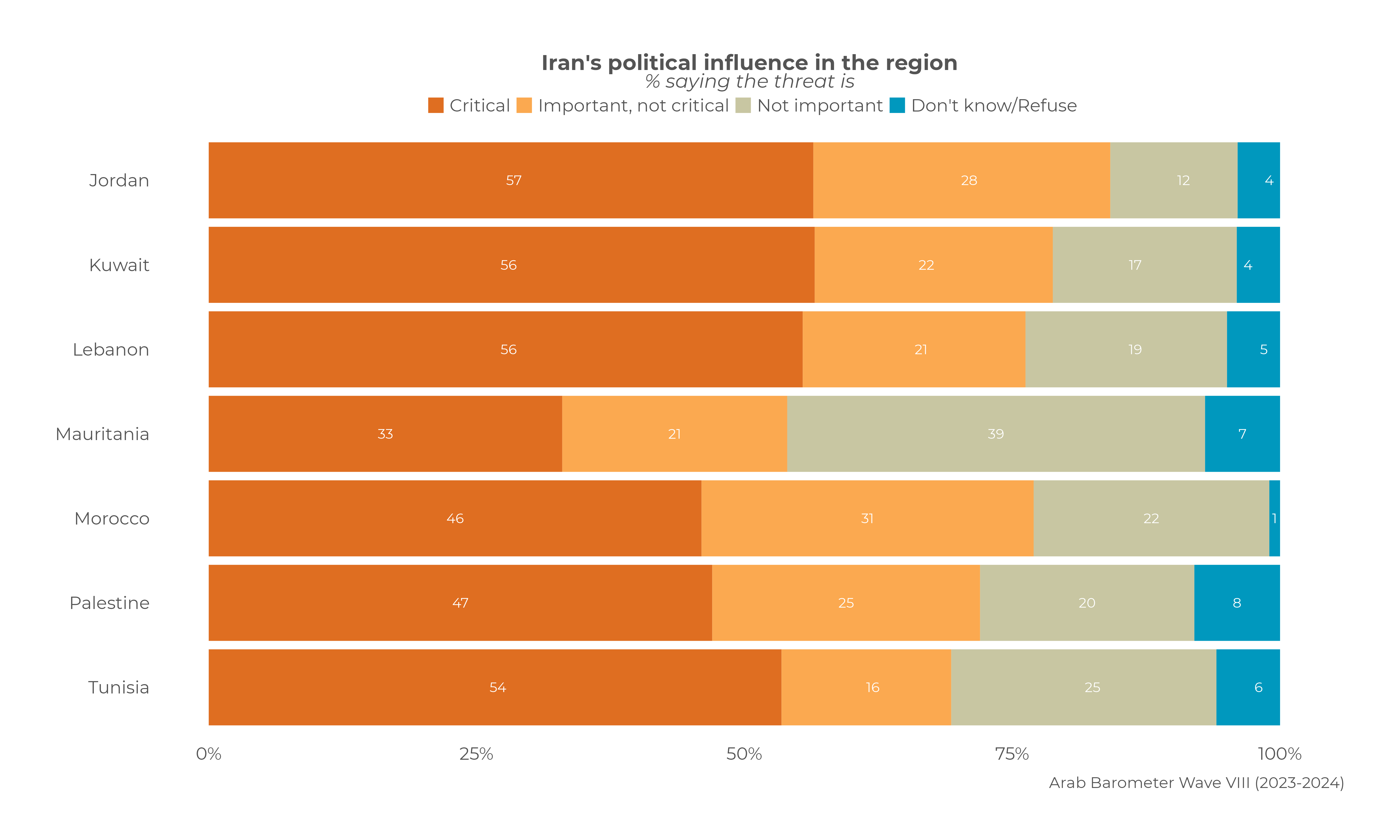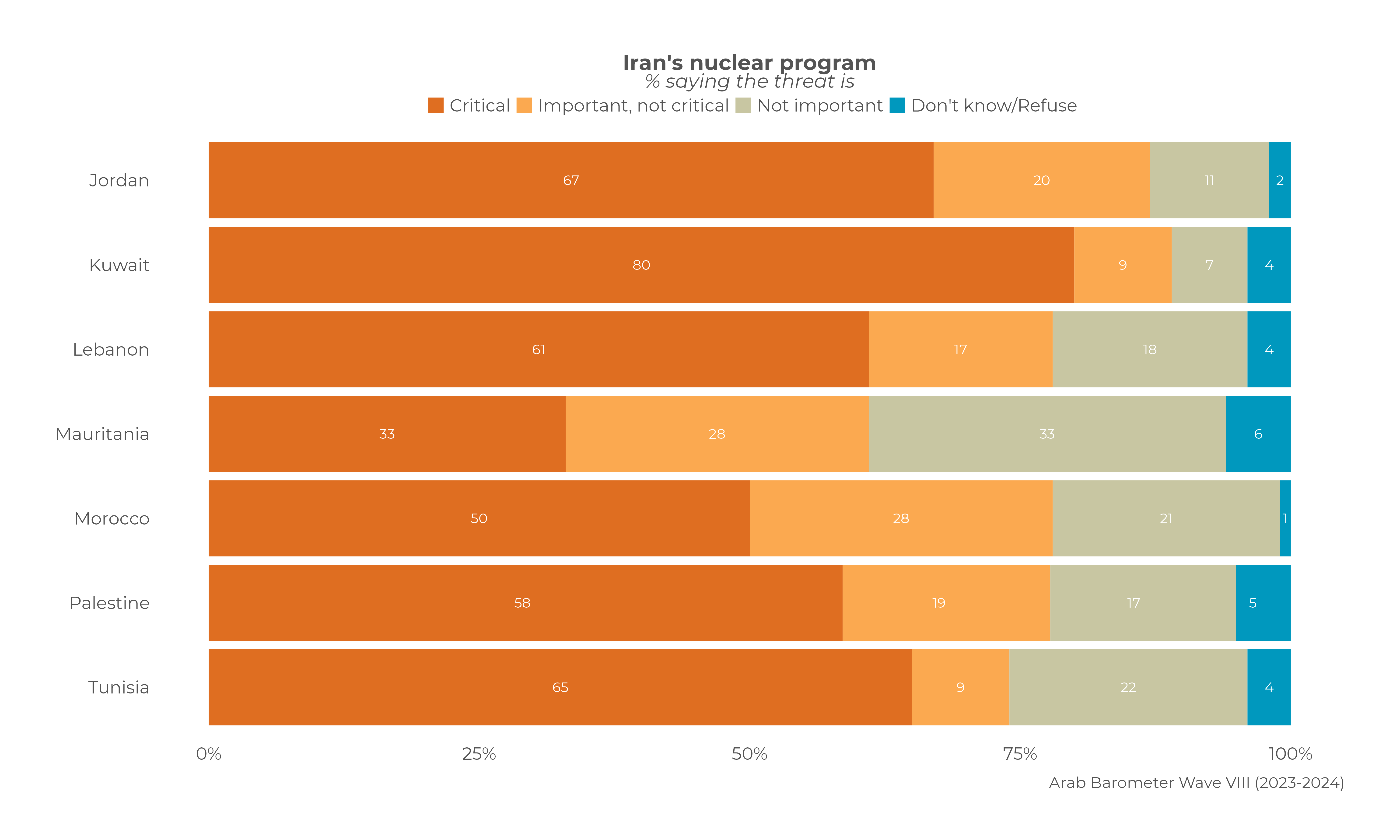During his speech to U.S. Congress in late July, Israeli Prime Minister Benjamin Netanyahu’s comments conflating support for Palestine with blind allegiance to Iran were not just factually unsubstantiated. They were also built on a faulty and falsifiable assumption: that the convergence of stances on Palestine automatically implied a causal relationship between the actions of citizens protesters on the one hand and Iranian foreign policy on the other.
Instead, Arab Barometer’s latest 2024 data suggest that opposing Israel’s war on Gaza and opposing Iran and its regional proxies’ and allies’ policies in the region are not mutually exclusive positions. Citizens in the Middle East and North Africa (MENA) are more nuanced and parsimonious in their opinions: the whole of their views sums much more than just Tehran’s positions on Palestine.
Moreover, Netanyahu’s dismissal of expressed opposition as “bought and paid for” to delegitimize it underscores the double standards of “free” speech that have plagued the discourse surrounding the war in Gaza over the past nine months. Unequivocally equating protest with propaganda implies that any criticism of Israel can only be the product of coercion or cooptation. This line of reasoning sounds eerily similar to the statements made by MENA autocrats, who, at the height of Arab Spring, dismissed protesters calling for freedom, dignity, and justice as “foreign agents” or “terrorists.” To MENA citizens, Netanyahu’s refrain is not new and perhaps no less trite than Iran’s leveraging of the Palestinian cause in its vie for regional influence.
Israel’s latest war in Gaza reignited public outcry in the region. Arab Barometer survey results reveal that majorities of citizens deem Israel’s blockade of Gaza since 2007, its most recent bombing and assault on infrastructure there, and forced displacement of Gazans as acts of terrorism. And from a list of terms that included war, mass killing, conflict, ethnic cleansing, hostilities, and massacre, the greatest number of citizens in Jordan, Kuwait, Lebanon, and Mauritania see Israel’s actions as a genocide. Unsurprisingly, support for normalizing relations with Israel ranges from just three percent in Jordan to at most 13 percent in Morocco.
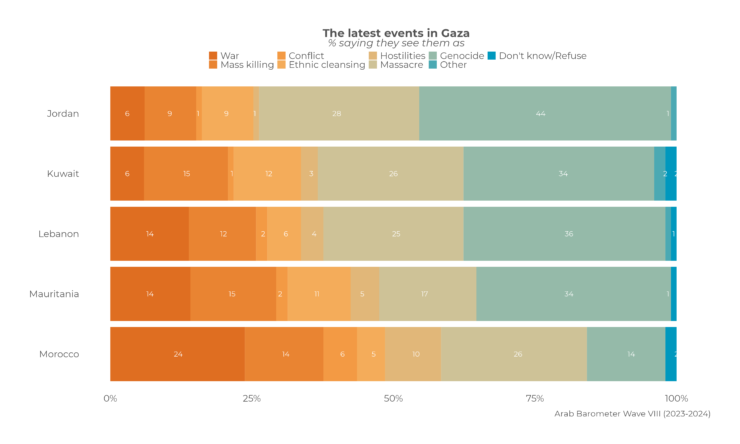 Despite ire with American policy stances towards the war in Gaza, pluralities of citizens in most countries believe that Palestine should be the Biden administration’s top priority. Yet, as impartial a broker as the United States is seen, the percentage of citizens who said it was suited to mediate a fair political solution to both Palestinians and Israelis surpasses the percentage who said the same about other countries in the so-called Axis of Resistance, including China and Russia.
Despite ire with American policy stances towards the war in Gaza, pluralities of citizens in most countries believe that Palestine should be the Biden administration’s top priority. Yet, as impartial a broker as the United States is seen, the percentage of citizens who said it was suited to mediate a fair political solution to both Palestinians and Israelis surpasses the percentage who said the same about other countries in the so-called Axis of Resistance, including China and Russia.
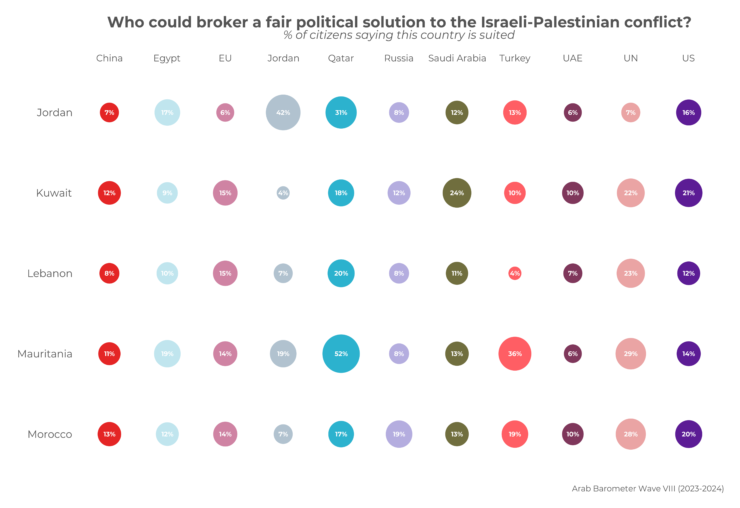 Overall, favorability of Iran is low across surveyed countries. A minority of citizens in each Lebanon (36 percent), Palestine (28 percent), Jordan (25 percent), and Kuwait (15 percent) have a very or somewhat favorable view of the country. And equally small shares have positive assessments of the foreign policy of Supreme Leader Ali Khamenei, ranging from just nine percent in Kuwait and maxing out at 32 percent in each Lebanon and Tunisia. In all surveyed countries save Lebanon, the only leaders whose policies are less favored than Khamenei’s are variously American President Joseph Biden and/or Syrian President Bashar Assad.
Overall, favorability of Iran is low across surveyed countries. A minority of citizens in each Lebanon (36 percent), Palestine (28 percent), Jordan (25 percent), and Kuwait (15 percent) have a very or somewhat favorable view of the country. And equally small shares have positive assessments of the foreign policy of Supreme Leader Ali Khamenei, ranging from just nine percent in Kuwait and maxing out at 32 percent in each Lebanon and Tunisia. In all surveyed countries save Lebanon, the only leaders whose policies are less favored than Khamenei’s are variously American President Joseph Biden and/or Syrian President Bashar Assad.
While Palestine figures frequently and prominently in Iran’s political rhetoric and strategy in its vie for regional influence, Tehran’s pursuits and policies in the region are not ones that citizens throughout the region view positively. Just under half of all citizens in Palestine (47 percent) and Morocco (46 percent) and more than half in Jordan (57 percent), Lebanon (56 percent), Kuwait (56 percent), and Tunisia (54 percent) believe than Iran’s political influence in the region represents a critical threat to their national security interests. And half or more citizens in all countries but Mauritania say the same about Iran’s nuclear program. In Kuwait, the share of citizens saying Iran’s nuclear program represents a critical threat (80 percent) is nearly identical to the share saying the same of Israel’s occupation of the Palestinian territories (83 percent).
And when it comes to Tehran’s allies and proxies, MENA publics are equally skeptical. They are mostly critical of Russia, and they overwhelmingly disapprove of Syrian President Bashar Assad. Iran’s proxy Hezbollah, which even inside Lebanon only enjoys strong support among the Shiite community, historically has not been seen as a force for good in the region. Data from Arab Barometer Wave VII (2022-2023) revealed that few citizens in Sudan (30 percent), Lebanon (24 percent), Mauritania (23 percent), Iraq (16 percent), and Jordan (six percent) agreed with the statement, “It is good for the Arab region that Hezbollah is getting involved in regional politics.”
Ultimately, for it to have worked, Netanyahu’s strategy to delegitimize critics of Israel by painting them as Iranian stooges would have required these critics to not also be critical of Iran. In this, MENA publics seem to have beaten him to the punch line.
This blog has been revised to correct an error in the survey question regarding perceptions of potential parties to broker a solution to the Israeli-Palestinian conflict. Not all surveyed countries correctly received “Iran” as a response option.
